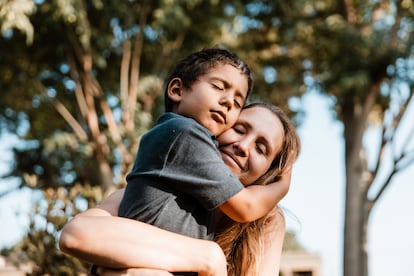Why hugs are essential for babies, children and the rest of us
Cuddling and kissing children generates the release of feel-good hormones that promote relaxation and tranquility. Touch can also be the key to more confident and courageous adults

Physical contact for babies is as essential for their well-being and development as food. This explains why we have millions of neural connections in the skin – the largest organ in the body. Science supports this assertion and several studies conducted in orphanages and children’s hospitals have come to the same conclusion.
In research carried out before World War I, the American doctor Fritz Talbot established that mortality was surprisingly low in a certain orphanage due to the fact that a nurse there spent hours every day holding the children in her arms, increasing their chances of survival.
Another more recent study, conducted in 2020 by Italian and English researchers, concluded that affectionate contact is effective in reducing infants’ responses to stress while nurturing their physical and neurocognitive development, and regulating their physiological state.
The fact is that people need to feel other skins from birth. “Being touched, hugged, cuddled, cradled and kissed is an essential part of human survival,” says Montserrat Díaz, neuropsychologist at the San Lorenzo Integral Center in San Lorenzo de El Escorial in the Madrid region. When a baby cries, we calm them by rocking them in our arms: “We like our skin to be touched and, moreover, to be touched in an attentive, warm way,” she adds.
Everyday life offers a multitude of possibilities to nurture children’s need for touch such as hugging, cradling, kissing, giving a bottle while the child sits on our lap, dressing, bathing, changing a diaper, massaging and simply holding the child, either by the hand or in our arms. “All of these things involve direct contact with the baby or child, which stimulates their sense of touch. This can have a great influence on the healthy and harmonious development of children, but, for it to be effective, it needs to be done softly and attentively,” says Díaz who adds that human beings are prepared and programmed to receive stimulation through touch: “The absence of physical contact can cause a slowdown in the growth and anatomical development in children’s brains,” she says.
Another way to promote well-being through skin contact, especially in infants, is massage, which can reduce stress in both the parent and the child: “It also nurtures healthy weight gain and improves the quantity and quality of sleep,” says Díaz. “In the case of premature newborns, it has been proven to improve their immune system, facilitate digestion and increase the presence of hormones that promote health, such as oxytocin, serotonin and dopamine.”
No downsides to hugs
Are children spoiled by too many cuddles? According to Erika Jiménez, a neuropediatrician at the King Juan Carlos Móstoles hospital in Madrid, this assumption is outdated: “Cuddling and kissing children causes the release of hormones, such as oxytocin and endorphins, which produce happiness, well-being and generate relaxation and tranquility,” she affirms. As Jiménez explains, the children will also develop into more confident and courageous adults, with solid self-esteem, will suffer fewer physical ailments and will have a healthy immune system: “The more difficult a child is, the more love, cuddles and kisses he or she needs, because there is definitely no downside,” she says.
In fact, there is a specific approach to caring for premature babies, called the kangaroo or skin-to-skin method. This was first widely used in Colombia in 1978 as a strategy to deal with the lack of incubators in hospitals: “It was proven to be beneficial to newborns because it helps them to regulate their body temperature, to breastfeed for longer and to sleep better,” says Jiménez.
Experiencing touch is fundamental from birth, but also as we mature. It facilitates “a deeper and more honest emotional communication,” explains Gonzálo De Casso, a psychologist at the Nudos Center, a psychotherapy and parenting school. “There are people with a high degree of dementia, incapable of understanding or producing a coherent conversation who respond to cuddles and body contact,” he says.
According to De Casso, the language of body contact is universal and easy for children to understand: “They need to be loved, although each one is different and develops a different personality, different preferences and relationship style,” he says, adding that touch is fundamental to human development, especially at the start of our lives as it is our main resource for establishing contact with the world.
Tu suscripción se está usando en otro dispositivo
¿Quieres añadir otro usuario a tu suscripción?
Si continúas leyendo en este dispositivo, no se podrá leer en el otro.
FlechaTu suscripción se está usando en otro dispositivo y solo puedes acceder a EL PAÍS desde un dispositivo a la vez.
Si quieres compartir tu cuenta, cambia tu suscripción a la modalidad Premium, así podrás añadir otro usuario. Cada uno accederá con su propia cuenta de email, lo que os permitirá personalizar vuestra experiencia en EL PAÍS.
¿Tienes una suscripción de empresa? Accede aquí para contratar más cuentas.
En el caso de no saber quién está usando tu cuenta, te recomendamos cambiar tu contraseña aquí.
Si decides continuar compartiendo tu cuenta, este mensaje se mostrará en tu dispositivo y en el de la otra persona que está usando tu cuenta de forma indefinida, afectando a tu experiencia de lectura. Puedes consultar aquí los términos y condiciones de la suscripción digital.









































